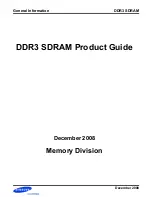
1-6
5) The Authenticator field (16 bytes) is used to authenticate the response from the RADIUS server;
and is used in the password hiding algorithm. There are two kinds of authenticators: Request
Authenticator and Response Authenticator.
6) The Attributes field contains specific authentication/authorization/accounting information to provide
the configuration details of a request or response message. This field contains a list of field triplet
(Type, Length and Value):
z
The Type field (one byte) specifies the type of an attribute. Its value ranges from 1 to 255.
Table 1-2
lists the attributes that are commonly used in RADIUS authentication/authorization.
z
The Length field (one byte) specifies the total length of the attribute in bytes (including the Type,
Length and Value fields).
z
The Value field (up to 253 bytes) contains the information of the attribute. Its format is determined
by the Type and Length fields.
Table 1-2
RADIUS attributes
Type field value
Attribute type
Type field
value
Attribute type
1 User-Name 23
Framed-IPX-Network
2 User-Password
24
State
3 CHAP-Password
25
Class
4 NAS-IP-Address
26
Vendor-Specific
5 NAS-Port 27
Session-Timeout
6 Service-Type
28
Idle-Timeout
7 Framed-Protocol
29
Termination-Action
8 Framed-IP-Address
30
Called-Station-Id
9 Framed-IP-Netmask
31 Calling-Station-Id
10 Framed-Routing
32
NAS-Identifier
11 Filter-ID
33
Proxy-State
12 Framed-MTU
34
Login-LAT-Service
13 Framed-Compression
35
Login-LAT-Node
14 Login-IP-Host
36
Login-LAT-Group
15 Login-Service
37
Framed-AppleTalk-Link
16 Login-TCP-Port
38
Framed-AppleTalk-Network
17 (unassigned) 39
Framed-AppleTalk-Zone
18 Reply-Message
40-59
(reserved
for
accounting)
19 Callback-Number
60
CHAP-Challenge
20 Callback-ID 61
NAS-Port-Type
21 (unassigned) 62
Port-Limit
22 Framed-Route
63
Login-LAT-Port
The RADIUS protocol has good scalability. Attribute 26 (Vender-Specific) defined in this protocol allows
a device vendor to extend RADIUS to implement functions that are not defined in standard RADIUS.
















































